Toyota Corolla Cross VS Toyota C-HR – Specs, Efficiency & Price Comparison
Which model is the better choice – the Toyota Corolla Cross or the Toyota C-HR? We compare performance (197 HP vs 223 HP), boot capacity (425 L vs 447 L), efficiency (5.10 L vs 0.80 L), and of course, the price (31300 £ vs 29100 £).
Find out now which car fits your needs better!
The Toyota Corolla Cross (SUV) is powered by a Full Hybrid engine and comes with a Automatic transmission. In comparison, the Toyota C-HR (SUV) features a Full Hybrid or Plugin Hybrid engine and a Automatic gearbox.
When it comes to boot capacity, the Toyota Corolla Cross offers 425 L, while the Toyota C-HR provides 447 L – depending on what matters most to you. If you’re looking for more power, you’ll need to decide whether the 197 HP of the Toyota Corolla Cross or the 223 HP of the Toyota C-HR suits your needs better.
There are also differences in efficiency: 5.10 L vs 0.80 L. In terms of price, the Toyota Corolla Cross starts at 31300 £, while the Toyota C-HR is available from 29100 £.
Compare all the key specs now and find out which model fits your lifestyle best!
In the battle between the Toyota C-HR and the Toyota Corolla Cross, both models showcase the brand's commitment to blending style with functionality. The C-HR stands out with its bold, coupe-like design and sportier driving dynamics, appealing to a younger audience. Meanwhile, the Corolla Cross offers a more traditional SUV experience, with spacious interiors and practicality, making it a solid choice for families.
Toyota Corolla Cross
The Toyota Corolla Cross is a stylish and versatile SUV that seamlessly blends the reliability of the Corolla lineage with the practicality of a modern crossover. Its spacious interior and elevated driving position provide a comfortable and commanding experience, making it an attractive choice for families and adventurers alike. With a focus on efficiency and performance, the Corolla Cross promises a smooth ride while maintaining the brand's commitment to quality and durability.
details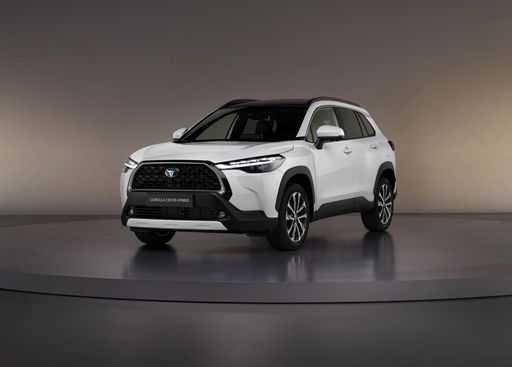 @ Toyota
@ Toyota
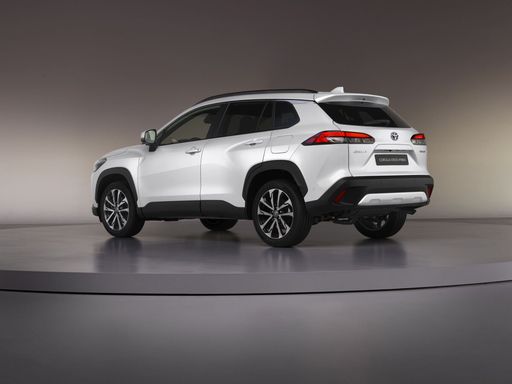 @ Toyota
@ Toyota
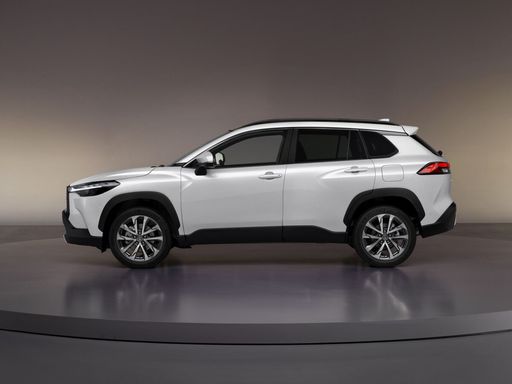 @ Toyota
@ Toyota
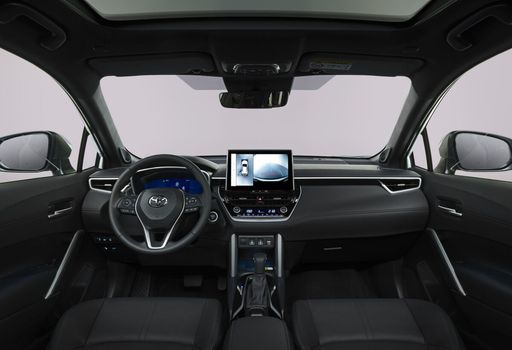 @ Toyota
@ Toyota
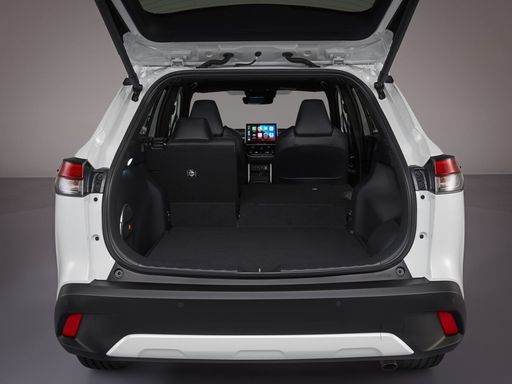 @ Toyota
@ Toyota
Toyota C-HR
The Toyota C-HR stands out with its distinctive and bold design that combines sleek, angular lines with a sporty posture. Its comfortable and stylish interior is equipped with advanced technology features, providing a seamless driving experience. The vehicle offers impressive handling and performance, making it a compelling choice for those who appreciate a blend of practicality and flair on the road.
details @ Toyota
@ Toyota
 @ Toyota
@ Toyota
 @ Toyota
@ Toyota
 @ Toyota
@ Toyota
 @ Toyota
@ Toyota
Toyota C-HR vs. Toyota Corolla Cross: A Comprehensive Comparison
In the competitive SUV market, two models stand out in the Toyota lineup: the Toyota C-HR and the Toyota Corolla Cross. Both vehicles promise utility, efficiency, and style, but they cater to slightly different audiences. This article takes a deep dive into both models, examining their technical specs, innovations, and what they offer to potential buyers.
Engine and Performance
The Toyota C-HR offers a choice between full hybrid and plug-in hybrid powertrains. With power outputs ranging from 140 HP to a more robust 223 HP, drivers can select based on their performance needs and preferences. The C-HR accelerates from 0 to 100 km/h in as little as 7.4 seconds, offering an engaging driving experience.
On the other hand, the Toyota Corolla Cross features a streamlined engine offering, with only full hybrid options that provide up to 197 HP. The acceleration capabilities mirror those of the C-HR, with some variants achieving 0 to 100 km/h in just 7.6 seconds. Both models boast a continuously variable transmission (CVT), ensuring smooth gear transitions.
Fuel Efficiency
Environmental consciousness is a top priority for many buyers today. The C-HR shines with impressive fuel consumption figures, ranging from 4.7 to 5.1 L/100km depending on the engine choice. It also features an electric range of 67 km, making it suitable for city commutes on electric power alone.
The Corolla Cross is slightly less efficient, logging 5.3 L/100km on average. While it doesn’t match the C-HR’s electric driving capabilities, it remains competitive in overall efficiency, showcasing Toyota's commitment to creating fuel-efficient vehicles across their SUV line.
Dimensions and Cargo Space
Dimensionally, the C-HR measures 4362 mm in length, 1832 mm in width, and reaches a height of 1564 mm, while the Corolla Cross is slightly larger at 4460 mm long, 1825 mm wide, and 1620 mm high. This difference gives the Corolla Cross a more commanding presence on the road.
When it comes to trunk capacity, the C-HR offers between 350 to 447 liters, depending on the variant. The Corolla Cross slightly edges ahead with a trunk capacity of up to 425 liters, providing more room for luggage and everyday essentials.
Safety and Technology
Both models are equipped with Toyota's latest safety innovations, including the Toyota Safety Sense suite, which encompasses pre-collision systems, lane departure alerts, and adaptive cruise control. They also focus on passenger comfort with modern infotainment systems, featuring Apple CarPlay and Android Auto integration.
New for 2025, both the C-HR and Corolla Cross will likely see upgrades in tech features, including enhanced connectivity and driver assistance systems aimed at making the driving experience safer and more enjoyable.
Conclusion
In the battle of the Toyota C-HR versus the Toyota Corolla Cross, your choice will depend largely on personal preferences and lifestyle. The C-HR appeals to those looking for advanced hybrid technology and sporty performance, while the Corolla Cross offers more space and slightly better trunk capacity.
Ultimately, Toyota has positioned both SUVs as solid contenders in the compact SUV market, each bringing its own strengths to the table. Whether you prioritize efficiency, space, or performance, there’s a Toyota SUV waiting to meet your needs.

|

|
|
|
|
Costs and Consumption |
|
|---|---|
|
Price
31300 - 41100 £
|
Price
29100 - 42800 £
|
|
Consumption L/100km
5.1 - 5.3 L
|
Consumption L/100km
0.8 - 5.1 L
|
|
Consumption kWh/100km
-
|
Consumption kWh/100km
-
|
|
Electric Range
-
|
Electric Range
68 km
|
|
Battery Capacity
-
|
Battery Capacity
-
|
|
co2
114 - 121 g/km
|
co2
17 - 115 g/km
|
|
Fuel tank capacity
43 L
|
Fuel tank capacity
43 L
|
Dimensions and Body |
|
|---|---|
|
Body Type
SUV
|
Body Type
SUV
|
|
Seats
5
|
Seats
5
|
|
Doors
5
|
Doors
5
|
|
Curb weight
1450 - 1575 kg
|
Curb weight
1505 - 1755 kg
|
|
Trunk capacity
414 - 425 L
|
Trunk capacity
350 - 447 L
|
|
Length
4460 mm
|
Length
4362 mm
|
|
Width
1825 mm
|
Width
1832 mm
|
|
Height
1620 mm
|
Height
1558 - 1564 mm
|
|
Payload
440 - 490 kg
|
Payload
375 - 425 kg
|
Engine and Performance |
|
|---|---|
|
Engine Type
Full Hybrid
|
Engine Type
Full Hybrid, Plugin Hybrid
|
|
Transmission
Automatic
|
Transmission
Automatic
|
|
Transmission Detail
-
|
Transmission Detail
-
|
|
Drive Type
Front-Wheel Drive, All-Wheel Drive
|
Drive Type
Front-Wheel Drive, All-Wheel Drive
|
|
Power HP
140 - 197 HP
|
Power HP
140 - 223 HP
|
|
Acceleration 0-100km/h
7.6 - 9.4 s
|
Acceleration 0-100km/h
7.4 - 9.9 s
|
|
Max Speed
180 km/h
|
Max Speed
175 - 180 km/h
|
|
Torque
-
|
Torque
-
|
|
Number of Cylinders
4
|
Number of Cylinders
4
|
|
Power kW
103 - 145 kW
|
Power kW
103 - 164 kW
|
|
Engine capacity
1798 - 1987 cm3
|
Engine capacity
1798 - 1987 cm3
|
General |
|
|---|---|
|
Model Year
2024 - 2025
|
Model Year
2024 - 2025
|
|
CO2 Efficiency Class
D, C
|
CO2 Efficiency Class
C, B
|
|
Brand
Toyota
|
Brand
Toyota
|
Toyota Corolla Cross
An Introduction to the Toyota Corolla Cross
The Toyota Corolla Cross is the latest addition to the popular Corolla family, adding a versatile SUV model to the line-up. With its sleek design and innovative hybrid technology, it marks a significant step forward in offering efficiency, comfort, and capability in a compact SUV package. Designed for those who appreciate both urban and rural exploration, the Corolla Cross promises an experience that balances performance with practicality.
Powertrain and Efficiency
The Corolla Cross features a full-hybrid powertrain, delivering a balance of power and efficiency that Toyota is well-known for. Available with either a 1.8-litre or 2.0-litre engine, the vehicle offers a range of power outputs between 140 to 197 PS. This versatility ensures that drivers can choose a model that fits their specific needs, whether it be more economical daily driving or greater power for extended journeys.
All models are equipped with a Continuously Variable Transmission (CVT), optimising power delivery and contributing to an impressive fuel economy. The consumption figures range from 5.1 to 5.3 L/100 km, making it an environmentally friendly option within the SUV market.
Driving Dynamics and Technology
The Corolla Cross offers a selection of drivetrain options, including both front-wheel drive and all-wheel drive, to cater to varying driving conditions and user preferences. The all-wheel-drive models are referred to as AWD-i, incorporating Toyota's intelligent system that adapts to the terrain, enhancing handling and safety.
Technological innovations include Toyota's Safety Sense suite, a comprehensive set of features that enhance driving safety. With integrated systems such as adaptive cruise control, lane departure alert, and pre-collision brake assist, drivers can enjoy a more confident driving experience.
Comfort and Interior Design
The Toyota Corolla Cross isn't just about performance and safety; it also excels in passenger comfort and interior design. Offering seating for five passengers, it combines spaciousness with elegant styling, ensuring that every journey is a pleasure. The boot provides a practical 414 to 425 litres of cargo space, sufficient for all personal or familial needs.
Passengers will appreciate the high-quality materials and thoughtful design found across the various trim levels, including the Business Edition, Comfort, Team Deutschland, and others. Each trim offers a unique combination of features tailored to meet differing customer preferences, from base-level practicality to high-end luxury appointments.
Pricing and Models
The pricing for the Toyota Corolla Cross is competitive, especially given the hybrid technology it boasts. Prices range from €36,190 to €47,090, placing it well within reach of buyers looking for a combination of efficiency, style, and modern conveniences. The running costs reflect Toyota's attention to economical design, with expenses estimated between €1009 to €1178 per month.
From Business Edition to the well-equipped Style AWD-i, customers can select a version that perfectly matches their requirements, ensuring there's something for everyone in the Corolla Cross range.
The Corolla Cross: A Conclusion
The Toyota Corolla Cross stands out in the compact SUV segment due to its stellar combination of a hybrid powertrain, advanced safety technologies, and versatile interior space. With its blend of style, functionality, and eco-conscious engineering, it is an ideal choice for those seeking a reliable and efficient vehicle that meets modern lifestyle demands. The Corolla Cross undoubtedly represents Toyota's continued commitment to innovation and quality in every vehicle they produce.
Toyota C-HR
Revolutionising the Crossover Segment: The Toyota C-HR
The Toyota C-HR has firmly established itself as a standout contender in the compact crossover segment. Known for its distinct design and hybrid capabilities, the C-HR continues to prioritise innovation and efficiency. In this article, we delve into the technical details that make the 2024 iteration a compelling choice for discerning buyers.
Distinctive Design and Aerodynamics
The Toyota C-HR boasts a striking design that combines angular lines with modern aesthetics. This isn't merely for show; the design enhances aerodynamics, improving fuel efficiency and handling. With dimensions of 4362mm in length and a sophisticated structure, the C-HR strikes a balance between urban agility and on-road stability.
Impressive Hybrid Powertrains
The C-HR lineup offers innovative hybrid and plug-in hybrid drivetrain options. The full hybrid system is tailored for those who seek both economic and environmental benefits. It combines a petrol engine with an electric motor to deliver power outputs ranging from 140 to 223 PS, achieving remarkable fuel consumption rates from 0.8 to 5.1 L/100km. The 2.0 Plug-In Hybrid variant impresses with an electric range of 67 km, ideal for urban commuters.
Unmatched Efficiency and Performance
Acceleration figures for the C-HR range from 7.4 to 9.9 seconds to reach 0-100 km/h, ensuring a responsive driving experience. Maximum speeds between 175 and 180 km/h cater to those who appreciate a bit of zest on the open road. Coupled with CVT automatic transmission and both front-wheel and all-wheel-drive configurations, the C-HR adapts to various driving conditions with ease.
Advanced Technology and Features
Inside, the C-HR is equipped with the latest technology aimed at providing connectivity and comfort. The model hosts an array of features across its diverse trim levels, including Business Edition, Lounge, and the sporty GR SPORT. Each variant is designed to meet the demands of different lifestyles, ensuring there's a C-HR model to suit every taste.
Sustainability and Cost Efficiency
With CO2 emissions ranging from 19 to 115 g/km, the C-HR stands as a testament to Toyota's commitment to sustainability. Financially savvy consumers will also appreciate the running cost, with monthly expenses from €959 to €1204, and a cost per km as low as 38.4 cents. Such efficiency makes the vehicle an attractive option for eco-minded buyers.
Conclusion: A Forward-Thinking Choice
The 2024 Toyota C-HR embodies Toyota's forward-thinking approach to automotive innovation, blending eco-friendly hybrid technologies with stylish design and practicality. It offers a glimpse into the future of driving, where efficiency meets elegance. Whether you're a city dweller or an adventure seeker, the C-HR promises a driving experience that is both enjoyable and environmentally conscious.
The prices and data displayed are estimates based on German list prices and may vary by country. This information is not legally binding.
